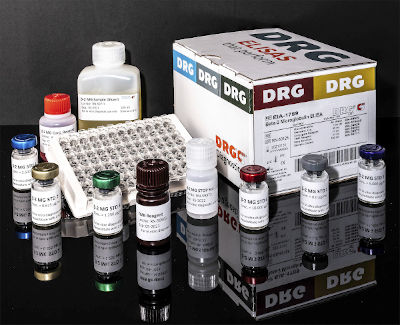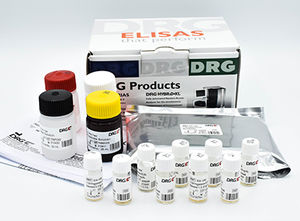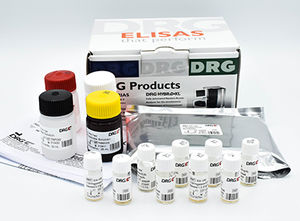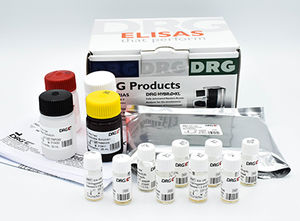
- Laboratory
- Laboratory medicine
- Immunoglobulin G test kit
- DRG Instruments GmbH
Autoimmune disease test kit EIA1789for beta-2 microglobulinIgGserum
Add to favorites
Compare this product
Characteristics
- Applications
- for autoimmune diseases
- Tested parameter
- for beta-2 microglobulin, IgG
- Sample type
- serum, urine, tissue
- Analysis mode
- enzyme immunoassay, molecular
- Result display time
20 min, 30 min
- Sample volume
0.01 ml
(0.00034 US fl oz)
Description
An enzyme immunoassay for the quantitative determination of beta-2 microglobulin (B2MG) concentration in serum. Beta-2-microglobulin (Beta2-MG) is expressed by the nucleated cells of the body and on many tumor lines. Human Beta2-MG is a low molecular weight protein (MW 11600) consisting of a single polypeptide chain of 99 amino acids. It is identical to the small chain of the HLA-A, -B, and -C major histocompatibility complex antigens. In structure and amino acid sequence, it resembles the CH3 region of IgG, though it is antigenically distinct. Beta2-MG is eliminated via the kidneys. After filtration through the glomeruli, it is reabsorbed and catabolized by the proximal tubular cells through endocytosis. It is found at low levels in the serum and urine of normal individuals. Typically only trace amounts of Beta2-MG are excreted in the urine and higher rates are interpreted as evidence of tubular dysfunction. Urinary excretion is markedly increased in tubulointerstitial disorders, and where aminoglycosides and anti-inflammatory compounds are present. Beta2-MG is also excreted in increased amounts in the urine of patients with upper urinary tract infections and connective-tissue diseases such as rheumatoid arthritis and Sjogren’s syndrome. Elevated serum concentrations in the presence of normal glomerular filtration rate suggest increased Beta2-MG production or release. In patients with rheumatoid arthritis, systemic lupus erythematosus, sarcoidosis and some viral diseases including cytomegalovirus, non-A and non-B hepatitis and infectious mononucleosis, the Beta2-MG serum level changes in relation to disease activity.
Catalogs
No catalogs are available for this product.
See all of DRG Instruments GmbH‘s catalogsRelated Searches
- Assay kit
- Blood assay kit
- Serum assay kit
- Immunoassay assay kit
- Plasma assay kit
- Infectious disease detection kit
- Research reagent kit
- Molecular test kit
- Respiratory infection test kit
- Optical assay kit
- Clinical assay kit
- Reagent medium reagent kit
- ELISA assay kit
- Bacteria reagent kit
- Research assay kit
- IgG test kit
- Laboratory detection kit
- Cell assay kit
- Microbiology reagent kit
- Urine assay kit
*Prices are pre-tax. They exclude delivery charges and customs duties and do not include additional charges for installation or activation options. Prices are indicative only and may vary by country, with changes to the cost of raw materials and exchange rates.







